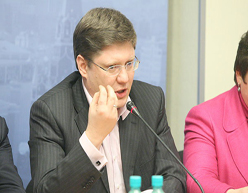Key United Russia party members’ critical public statements point to dissent among the ruling elite

In a sign highlighting the growing dissent among the key members of the ruling United Russia party, the pro-government political organization headed by Prime Minister Vladimir Putin and other Cabinet officials, a group of influential party members have penned an open letter harshly condemning the Finance Ministry’s handling of the government’s policies aimed at taming the current global crisis and its drastic effects on the economy.
Apart from the ruthless criticism, the group also proposed a myriad of far-reaching economic and political measures for fighting the crisis that are at loggerheads with the party and government’s current official policies on these issues. “Our evaluation of the ministry’s activities is negative, as it is not effectively carrying out all the tasks set down by the prime minister,” said Andrei Isaev, one of the signatories to the letter, the chairman of the State Duma Labor and Social Policy Committee, who also doubles as the first deputy secretary of the Presidium of General Council of the United Russia Party. Other signatories included member of the party’s Supreme Council Valery Ryazansky, Yuri Shuvalov, the deputy secretary of the party’s General Council Presidium, party member and State Duma legislator Alexander Khinshtein and several others.
This is the second time in the past week, when high-ranking members of the ruling elite officially made public statements that ran counter to the official positions of both the powerful United Russia Party and Putin’s Cabinet on the global financial crisis, a negative trend that only serves to underscore the rising dissent among top party functionaries and/or key government officials, who are finding it increasingly difficult to toe the official lines on these key policy issues.
For instance, just last week, Andrei Klepach, deputy minister at the Economic Development Ministry, citing the drastic fall in the levels of industrial output in October-November and the expected overall record low yearend value of about 1.9%, said that the Russian economy has officially entered into a recession. “In fact, recession has begun in Russia, and I’m very much afraid that this will extend beyond the first two quarters of 2009.” This was the first direct official acknowledgement of recession among top government members, which is contrary to the generally accepted official line on this subject.
It was, therefore, not surprising that the ‘talkative’ bureaucrat was later rectified by his senior colleagues in the Cabinet, notably from the Finance Ministry and the government's Press Department. “There is no recession in Russia,” Alexei Kudrin, the finance minister, who also doubles as deputy prime minister told the press corps after a government meeting dedicated to economic issues, while Russian government spokesman Dmitry Peskov told the press to rely on the Cabinet’s official position on the issue, rather than that of the lower-ranking bureaucrat’s opinion. “The use of the term 'recession' was inappropriate, because there is no recession in the country and nor will there be in the foreseeable future," he said. "There is no reason to speak about recession. We would rather speak about decline in growth."
The signatories to the caustic criticism-loaded open letter specifically noted that their main goal was to initiate an open discussion from all quarters on the issues of the economic crisis and measures to address its negative fallouts in the country. Their harshest criticism was specifically directed at the current policy, under which the government, in its attempt to stimulate the economic and generate demand, is pumping trillions of rubles into the economy through commercial banks which are hoarding the money in their vaults instead of passing the money further to their intended recipients.
Calling such policy ineffective, the signatories called on the government to provide financial aid from the Stabilization Fund directly to their intended recipients that will use the money as they deem fit, thereby, generating demand for goods and services in the country, and hence stimulating the national economy. “Most of our proposals will be met with disapproval by top government officials, and even our colleagues within the United Russia Party,” Isaev said. “However, we hope that other clubs in the party will offer their own visions, initiatives and proposals on how to combat this crisis. This will lead to an open and constructive discussion, which will enable our party leadership, after listening to all points of views, to take the best decisions.”
The signatories to the letter specially noted that their criticism is not a call for the party leadership and prime minister to sack the long-serving finance minister. “All the HR decisions are the exclusive prerogatives of the party leader and prime minister,” Isaev said. “We trust him and always support all his decisions on these issues.”












 Web design,
Web design,